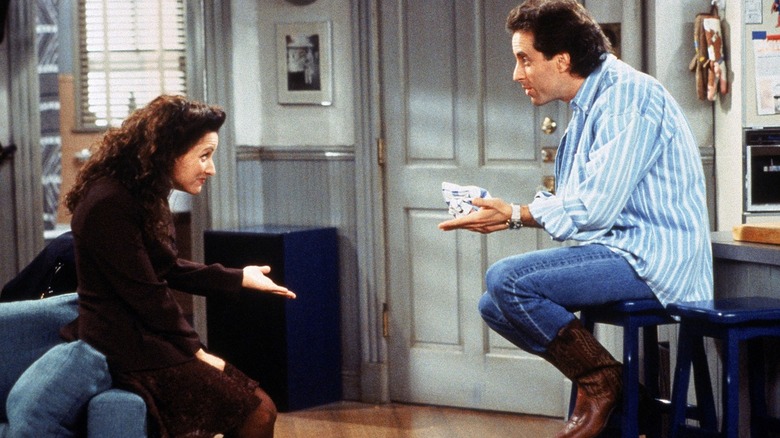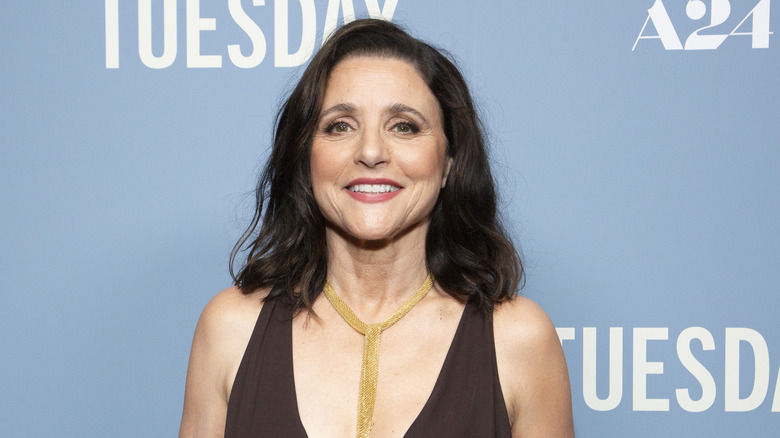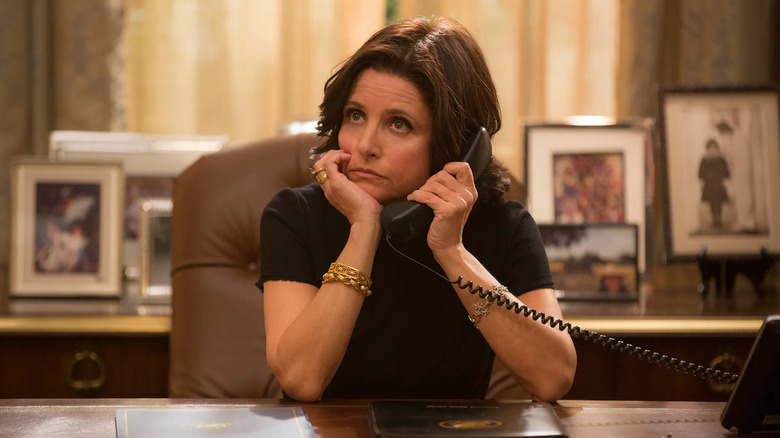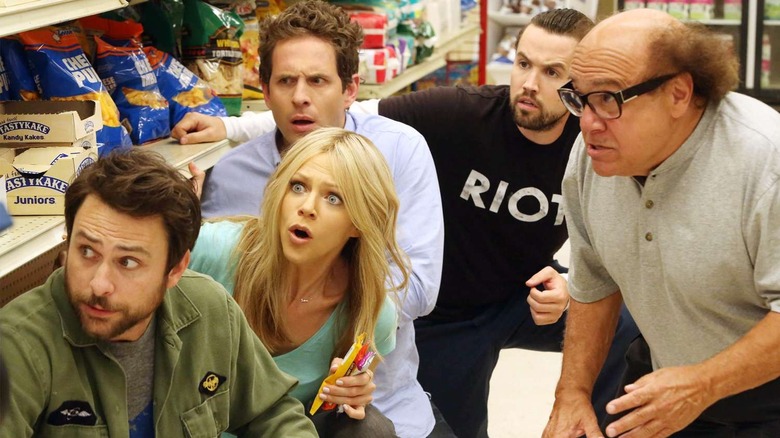Why Julia Louis-Dreyfus Shot Down Jerry Seinfeld's Controversial 'PC' Comments
Jerry Seinfeld just joined the chorus of older, wealthy comedians who say that you can't be "funny" anymore or make jokes because everything is too politically correct. His former "Seinfeld" co-star Julia Louis-Dreyfus has her own take on that complaint ... which is to say that she doesn't agree with Seinfeld's point of view, apparently.
In a wide-ranging interview with The New York Times where she opened up about some pretty dark topics — including her experience with cancer and the idea of death — Louis-Dreyfus addressed Seinfeld's recent comments after interviewer Lulu Garcia-Navarro brought it up. "Your former co-star Jerry Seinfeld recently made news for talking about political correctness in comedy," Garcia-Navarro asked. "I'm wondering, as a famous comedian yourself, what you think about that."
"If you look back on comedy and drama both, let's say 30 years ago, through the lens of today, you might find bits and pieces that don't age well," Louis-Dreyfus responded. "And I think to have an antenna about sensitivities is not a bad thing. It doesn't mean that all comedy goes out the window as a result. When I hear people starting to complain about political correctness — and I understand why people might push back on it — but to me that's a red flag, because it sometimes means something else. I believe being aware of certain sensitivities is not a bad thing. I don't know how else to say it."
Julia Louis-Dreyfus had more thoughts about what's really putting comedy in jeopardy
Ultimately, Julia Louis-Dreyfus had a lot to say about the place of political correctness in comedy — but she also wanted to say more about what's really endangering real art and comedy in this day and age. As the interview notes, the Emmy-winning actress and Lulu Garcia-Navarro spoke eleven days after Louis-Dreyfus' initial comment, and she told the interviewer that she wanted to be extremely clear about where she stood on the issue.
"My feeling about all of it is that political correctness, insofar as it equates to tolerance, is obviously fantastic," Louis-Dreyfus clarified. "And of course I reserve the right to boo anyone who says anything that offends me, while also respecting their right to free speech, right? But the bigger problem — and I think the true threat to art and the creation of art — is the consolidation of money and power. All this siloing of studios and outlets and streamers and distributors — I don't think it's good for the creative voice. So that's what I want to say in terms of the threat to art."
This is well-said — and to be frank, Louis-Dreyfus is a perfect person to address this the topic of "political correctness" and comedy. Why? Because she's become an internationally beloved comedic actress largely by playing odious characters ... and proving that comedy can still cross certain boundaries.
Julia Louis-Dreyfus has spent her career playing offensive women — and making them incredibly funny
Rather than making poorly-reviewed movies about breakfast foods, Julia Louis-Dreyfus has spent her career playing absolutely unlikable characters capable of selfishness and even outright cruelty — and not only has she made all of those characters intensely funny, she's won an astounding 11 Emmys for those roles. In the same interview, Louis-Dreyfus said this about her characters: "I don't play good girls. I don't play girls who behave a way that a good girl should behave. If they do, they do it with bitterness and anxiety." With that in mind, let's look closer at two of them: Elaine Benes from "Seinfeld" and Selina Meyer from "Veep," arguably her two most well-known roles.
Elaine isn't quite as horrible as Selina, but she's no angel; nobody on "Seinfeld" is, to be frank. Alongside the more overtly offensive George Costanza (Jason Alexander), she looks slightly more normal, but she's acerbic and often mean for no reason (like when her boyfriend gets into an accident and she wonders how long she'll have to keep dating him now that he's not as attractive). Selina Meyer, star of the sneering political satire "Veep," is far worse and even funnier, thanks to HBO's wildly flexible guidelines about profanities; in fact, most of Selina's very best quotes are unprintable here, as they're entirely too obscene. All of this is to say that Elaine and Selina are two of the funniest characters in the history of television — and the fact that they both say wildly offensive things doesn't change that. In fact, the horrible things they say make them funnier for one specific reason: both of Louis-Dreyfus' defining characters are always the butt of the joke, even when they're the ones punching down.
Comedies are still funny — it's just a matter of not punching down
Julia-Louis Dreyfus hasn't appeared on "It's Always Sunny in Philadelphia" — yet — but it's relevant to this discussion because it shares a major similarity with the comedienne's performances on "Seinfeld" and "Veep." The characters on "Always Sunny" are unequivocally horrible people ... and the show is so enduring that it's the longest-running live-action comedy series in the history of its medium. Frankly, as long as a show like "Always Sunny" is on the air, there's no room for anyone to argue that "political correctness" is ruining comedy, as there's absolutely none to be found in the FXX series. When the show does address hot-button real-life issues, with it does with some frequency, it never punches down, but makes the central gang the butt of the joke thanks to their ignorance (the Season 13 standout "The Gang Solves the Bathroom Crisis" is an ideal example of this).
To bring it back to Louis-Dreyfus, she did help pave the way — along with her other cast members from "Seinfeld" — for a show like "Always Sunny" to succeed. It could even be argued, and should be more often, that Elaine Benes walked so that Kaitlin Olson's utterly deranged Sweet Dee could run (right into a car). Louis-Dreyfus' take on political correctness in comedy is entirely spot-on — it's actually a good thing, because it helps artists become even more creative and hilarious without hurting the disenfranchised in the process, and anyone who says otherwise could stand to open their mind a bit.



